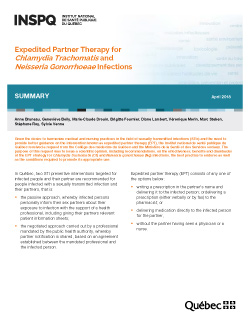Expedited Partner Therapy for Chlamydia Trachomatis and Neisseria Gonorrhoeae Infections
Given the desire to harmonize medical and nursing practices in the field of sexually transmitted infections (STIs) and the need to provide better guidance on the intervention known as expedited partner therapy (EPT), the Institut national de santé publique du Québec received a request from the Collège des médecins du Québec and the Ministère de la Santé et des Services sociaux. The purpose of this request was to issue a scientific opinion, including recommendations, on the effectiveness, benefits and drawbacks of the EPT strategy for Chlamydia trachomatis (Ct) and Neisseria gonorrhoeae (Ng) infections, the best practice to endorse as well as the conditions required to promote its appropriate use.
In Québec, two STI preventive interventions targeted for infected people and their partner are recommended for people infected with a sexually transmitted infection and their partners, that is:
- the passive approach, whereby infected persons personally inform their sex partners about their exposure to infection with the support of a health professional, including giving their partners relevant patient information sheets;
- the negotiated approach carried out by a professional mandated by the public health authority, whereby partner notification is shared, based on an agreement established between the mandated professional and the infected person.
Expedited partner therapy (EPT) consists of any one of the options below:
- writing a prescription in the partner’s name and delivering it to the infected person; or
- delivering a prescription (either verbally or by fax) to the pharmacist; or
- delivering medication directly to the infected person for the partner,
- without the partner having seen a physician or a nurse.


